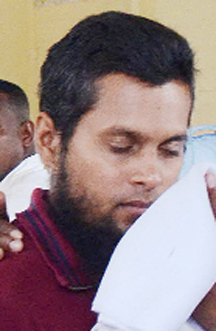Acting Chief Justice Ian Chang has upheld the decision to commit Muslim scholar Nezaam Ali to stand trial in the High Court for charges that he sexually abused nine minor boys.
The ruling was handed down by the Chief Justice last Friday at the High Court.
It is alleged that Ali, of 268 Section ‘C’ 5 South Turkeyen, during December, 2011 to January, 2012, being a teacher attached to the Turkeyen Masjid, engaged in sexual activity with the children by abusing a position of trust.

Ali, who has not been required to plead to the indictable charges, was committed to stand trial on November 25th, 2013 by Magistrate Alex Moore, who found that a prima facie case was established against him. “The best place for this case to be ventilated is in the High Court…,” the magistrate had stated at the time.
However, Ali, through his attorney Nigel Hughes, challenged the magistrate’s decision.
Among the grounds for his challenge was the contention that there was no evidence led during the preliminary inquiry into the charge to refute his medical evidence that it was impossible for him to commit the crimes because he was impotent.
In his affidavit in support of the motion filed before the High Court, Ali noted that the several statements with which he was served from the virtual complainants alleged that he had “penetrative” anal intercourse with them.
He noted further that at the close of the prosecution’s case, he laid over to the court a statement from Dr Walter Ramsahoye, who expressed his expert opinion that “the individual, [Ali’s] whose physiological systems are severely compromised, cannot have sex with boy, girl, man or woman as he cannot have an erection.”
The accused advanced that after this statement was laid, his attorney made submissions to the magistrate that “based on the contents of the report of the medical expert (which give the opinion that it was impossible for him to have committed the offence), and the fact that the report had not been refuted by any prosecution evidence,” the charge against him should be discharged on the ground that a prima facie case had not been made out.
Ali added that his attorney had advised him that Magistrate Moore acted in excess of his jurisdiction when he failed to consider that “impossibility” was a complete defence to the charges and when he found that the prosecution would produce expert witnesses to refute Dr Ramsahoye’s evidence although there was no such evidence before the court for him to consider and when he speculated that the prosecution would lead evidence to refute Dr. Ramsahoye’s statement.
The accused argued further that the magistrate acted in excess of jurisdiction when he failed to consider the evidence of impossibility as disclosed by the doctor and, in so doing, committed a procedural error and acted in breach of the rules of natural justice.
Ali had claimed that the doctor’s opinion was formed from information provided by the applicant and he was not one of the attending doctors who had treated the applicant for his medical condition.
The prosecution had contended that the statement of Dr Ramsahoye could not be considered by the court since it was laid over months after the specified period had expired.
Justice Chang ruled that Ali’s case was not one in which the evidence for the defence was “so cogent and compelling” that, even accepting all the evidence for the prosecution, “a committal was not justified.”
The judge said also that the case was not one in which the evidence for the prosecution had its own inherent weaknesses which had been further so weakened by the evidence of the witnesses for the defence “that a committal was not justified.”
The Chief Justice said that the court was of the view that the case is one in which the “jury will be called upon to pass on the credibility and reliability of witnesses for both the prosecution and defence (Dr Ramsahoye) and to choose between them-bearing in mind that there is no presumption of acceptability or reliability in favour of an expert’s evidence.”
The court noted too that even though the magistrate might have mentioned that he was disregarding the statement laid by the doctor, it did appear that he considered the doctor’s evidence since, on the applicant’s affidavit, the magistrate “speculated” that the prosecution would produce an expert witness to refute the evidence of Dr Ramsahoye.
“If, as alleged by the applicant, the Magistrate did not consider the statement of Dr Ramsahoye-because it was laid over seven months after the expiry of the prescribed period for so doing, then it was within his remit to do so for reason of procedural non-compliance,” the judge added. Justice Chang said that, on the other hand, if the magistrate did consider the statement “(as he seems to have done), then there is no ground for complaint by the applicant.”
The allegations of the abuse first came to light when the Child Care and Protection Agency (CC&PA) received an anonymous tip and officials there began an investigation that led them to the boys, who were then between the ages of four and ten.
The police were informed of the situation and after the boys were medically examined, Ali, who was employed with the Central Islamic Organisation of Guyana, was arrested, released on station bail and subsequently charged. Ali was also sent on leave, pending the outcome of the matter.





